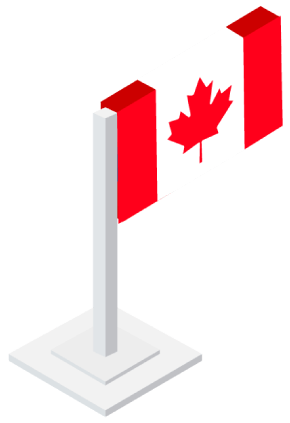Moving to France from Canada: Everything You Need to Know

Want to subscribe to a French energy offer?
Our English-speaking Selectra advisors are here to help you find the right energy plan.
(foreign IBANs accepted) at [email protected]. You can contact us also:

France plays a big part in Canadian history. From the colonization of Canada by French explorers in the 16th century, to Canadian Allied soldiers in both World Wars fighting on French soil, there’s a lot to learn and see as a Canadian visiting France today.
But if you want to do more than just visit and have been asking yourself, can I move to France from Canada?, you’re in the right place.
Use our moving to France checklist below to see what you need to know before making your big move abroad.
Applying for a French visa in Canada

So just how to move to France from Canada? Before you do anything, you’ll need to apply for a French visa. This allows you to legally stay in the country for more than 90 days.
You must sort out your visa status in Canada before immigrating. You cannot go to France within the 90-day tourist limit and apply for a visa there. Otherwise you will be kicked out of the country.
The type of visa you apply for depends on your circumstances. France-Visas, the French visa website, takes you through the process step-by-step.
If you’re unsure what type of visa you’ll need, you can take this short quiz first to figure out what’s best for your immigration situation. You will then be told what supplementary documents are required for your application (i.e., proof of enrollment, CV, proof of income, etc.).
You will be able to complete your application through the France-Visas portal. Once completed, you will be informed how to send your application to a processing centre.
Start your visa application early. Processing times vary depending on the time of year and your nationality. It is recommended that you submit your application and book your visa appointment at least one month before your departure.
Visa application centres are situated in Toronto, Montreal, Ottawa and Vancouver. All visa applications are processed by the Consulate General in Montreal. You can find a list of exact addresses for Canadian visa application centres here (in French).
You cannot submit your visa application more than three months before your departure.
Are you a Canadian citizen between 18-35 years of age?
You may be eligible to apply for a visa under the France-Canada Youth Mobility Agreement. This agreement is a simplified way for youth between the ages of 18 and 35 to apply for visas to study or work in France.
The initial visa period is either 12 or 24 months, but can be extended. The maximum amount of time allowed on this visa is 36 months.

The agreement offers visas in the following categories:
- Young Professional Development (3A Visa; short-term work contract)
- Inter-university exchanges (3B Visa)
- Internship (3C Visa)
- Working Holiday Visa (3D Visa)
You qualify for the agreement if you are:
- A Canadian citizen between the ages of 18 and 35
- Hold a Canadian passport that is valid for at least six months after the end of your visiting period
- Have proof of sufficient funds to allow them to stay in France and leave at any time
You must also pay any fees or taxes necessary and provide supplementary documentation when applying for your visa.
Applying for a student visa for France
Depending on your student status, you may also need to obtain an attestation SCAC, which is a notice from the Cultural Services of the French Embassy in Canada. You will need to submit this in addition to your visa application.
Canadian citizens studying in France
If you are a Canadian student going on an exchange program (agreed upon between the Canadian and French schools) to France, you will just need to apply for a visa and do not need a SCAC.
If you are a Canadian student looking to obtain a degree in France (Bachelors, Masters, MBA, etc.) you will need a SCAC before you submit a visa application. You must fill out this questionnaire and send it by email to one of these three contacts:
- If you live in Ontario (except Ottawa) or Manitoba, send your questionnaire to [email protected]
- If you live in Quebec, send it to [email protected]
- If you live in Ottawa, British Columbia, Alberta, Saskatchewan or the one of the Atlantic Provinces, send it to [email protected]
Non-Canadian and non-EU citizens studying in France
If you are not a Canadian citizen and are looking to studying in France either on an exchange program or for a degree, you will need to obtain a SCAC. To do so, fill out this questionnaire and send it by email to one of the three email addresses listed above.
You should receive your SCAC within seven working days. Make sure to bring it with you to your visa appointment.
EU or dual-EU citizens studying in France
You will not need to apply for a visa or a SCAC. As long as you have a valid EU passport, you are allowed to study, work and live in France.
Documents you’ll need before moving to France

Living in France means dealing with a lot of paperwork. It’s crucial for every application imaginable, from leases to health cards to social security numbers.
Before moving to France from Canada, make sure you have at least a digital and photocopy of the following documents:
- Passport, and passport-sized photos of yourself
- Birth certificate avec filiation (with your parents’ names)
- Marriage certificate, if applicable
- Medical documents (vaccinations, any private healthcare)
- Driver’s licence
- Bank account information and other financial documents
- Educational qualifications
- Tax documentation/returns from the last two years
This will save you a headache and a lot of time in the long run.
Moving and paying value-added tax (VAT)
You’ll need to get a Certificate de Changement de Résidence (change of residence certificate) and Certificat de Non Cession (non-resale certificate) from the French Consulate of Canada.
You don’t have to pay any duties on items you’ve owned for more than six months. Otherwise you will be charged around 20% VAT plus duties.
Everything you ship to France must arrive within the first year of your move.
Keep the receipts of these more recent purchases. You will need to write a detailed list of these items, including the date and place of purchase. The overall average value of all items should be converted into Euros and translated into French.
If you are missing receipts from more recent items, put them on the list anyway. You may need to file additional paperwork for them.
All items should be included on one single list, even if you are sending several shipments over to France at different times.
Healthcare in France

If you want to access the French healthcare system and you aren’t working in France, you must first register yourself in the French social security system.
You can do so by visiting your local Caisse Primaire d’Assurance Maladie (CPAM) and apply for a French health card (carte vitale). CPAM will tell you what additional documents they’ll need from you, such as your birth certificate and proof of residence.
Once you receive your carte vitale, you will then be reimbursed for any healthcare costs. However, the healthcare system will not cover everything (only about 70%).
Top-up medical insurance You can purchase additional insurance to cover any costs that aren’t covered by your carte vitale. In France, this is available as a mutuelle.
If you aren’t working, you can also access the healthcare system by applying to Protection Universelle Maladie (PUMa) and declaring you are sans activité professionnelle (without professional activity in France).
Setting up a bank account

We recommend that you set up a French or international bank account in Canada before you move. If you want to open a French bank account once you arrive in France, it will take 3-6 weeks to do so.
You will need a bank account (French or otherwise) to be able to sign up for French mobile or internet services, pay your energy bills and to be able to rent a property.
Paying taxes in France
You must pay French taxes once you become a French resident (living and working in France for more than 183 days). You will have to register yourself at your local tax office (hotel des impôts) or town hall (mairie). There you can pick up your tax form, or you can find it online.
The French file their taxes between April and May every year. You must file before May 31 or be fined 10% of your tax bill. Even if you know you won’t even break into the lowest tax bracket, you must file a return.
If you hold investments or financial accounts in Canada (or anywhere else in the world), you must declare them on your French tax return. You can find more information on declaring taxes while living temporarily outside of Canada here.
If you’re renting a property, you will also have to pay a housing tax. It is collected once a year and the amount varies depending on the town and your residence.
Receiving Canadian pensions in France
The Agreement of Social Security in 1981 allows Canadian and French citizens living in each others’ countries to receive Canadian and/or French pension benefits. The agreement includes the Canada Pension Plan (CPP) and the Old Age Security (OAS) program.
You must have contributed to both plans or lived in both Canada and France in order to benefit from the agreement. If you are a widow or widower of someone who contributed to a pension plan, you are also eligible for survivor benefits.
To find out more about the agreement, head over to the Government of Canada’s website here.
Staying in France long-term
If you want to live in France for longer than a year (typically what your visa allows), you will have to apply for an official residency permit (carte de séjour). You can do this at your local prefecture at least two months before your visa runs out.
You can apply for permanent residency without any conditions if you stay in France for five continuous years.
Moving to France from another country?You can check out these other articles about moving to France from the US, from the UK and from Australia.